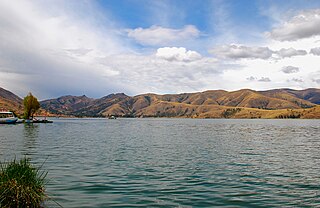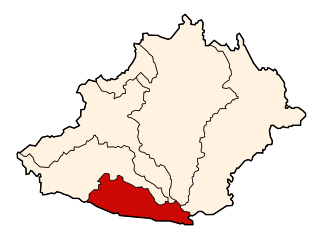| Julcán District | |
|---|---|
| District | |
| Country | |
| Region | Junín |
| Province | Jauja |
| Founded | January 21, 1925 |
| Capital | Julcán |
| Government | |
| • Mayor | Felix Mabi Ildefonso Quispe |
| Area | |
| • Total | 24.78 km2 (9.57 sq mi) |
| Elevation | 3,460 m (11,350 ft) |
| Population (2005 census) | |
| • Total | 814 |
| • Density | 33/km2 (85/sq mi) |
| Time zone | PET (UTC-5) |
| UBIGEO | 120412 |
Julcán District is one of thirty-four districts of the province Jauja in Peru. [1]

The districts of Peru are the third-level country subdivisions of Peru. They are subdivisions of the provinces, which in turn are subdivisions of the larger regions or departments. There are 1,838 districts in total.

Jauja Province is a Peruvian province. It is one of the nine provinces of the Junín Region. To the north it borders with the Yauli, Tarma and Chanchamayo Provinces. To the east with the Satipo Province, to the south with the Concepción Province and to the west with the Lima Region. The capital of the Jauja Province is the city of Jauja. The city was founded by Francisco Pizarro as the first capital of Peru.

Peru, officially the Republic of Peru, is a country in western South America. It is bordered in the north by Ecuador and Colombia, in the east by Brazil, in the southeast by Bolivia, in the south by Chile, and in the west by the Pacific Ocean. Peru is a megadiverse country with habitats ranging from the arid plains of the Pacific coastal region in the west to the peaks of the Andes mountains vertically extending from the north to the southeast of the country to the tropical Amazon Basin rainforest in the east with the Amazon river.



